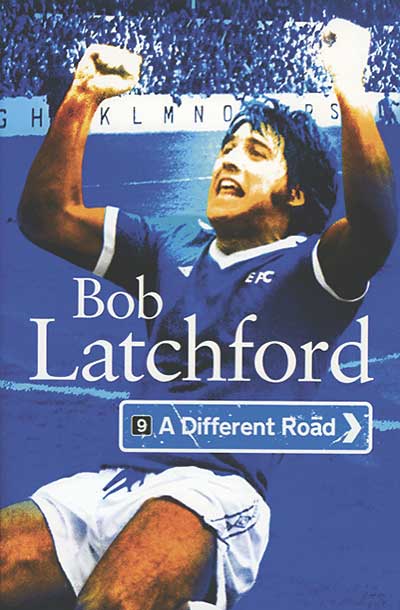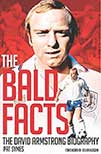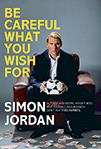Search: ' Trevor Francis'
Stories
A weekend of big matches at Wembley included plenty of choreographed displays but no place for supporter originality. In WSC 342, August 2015 Jon Spurling explained why
 by Bob Latchford
by Bob Latchford
deCoubertin Books, £20
Reviewed by Mark O’Brien
From WSC 348 February 2016
Perhaps to its detriment, but thoroughly in keeping with its subject, Bob Latchford’s thoughtful, detailed autobiography shies away from drama and sensationalism and tells the story of a modest, unassuming Birmingham boy who became the most expensive player in British football.
 The David Armstrong biography
The David Armstrong biography
by David Armstrong
with Pat Symes
Pitch Publishing, £17.99
Reviewed by Harry Pearson
From WSC 324 February 2014
There was always something a little Dickensian about Middlesbrough and Southampton midfielder David Armstrong. Small, prematurely bald, slightly portly with a face that fell naturally into an expression of melancholy, he was more Oliver Twist than the 1970s footballer of popular mythology. Even his nickname Spike has a whiff of the Victorian workhouse about it.
The nickname, it transpires, was given to him by Middlesbrough team-mate Basil Stonehouse for no other reason than that Stonehouse thought someone in the squad should have it. It’s the kind of anticlimactic tale that seems to have characterised Spike’s career. A hard-working left-sided player and an excellent passer and crosser, Armstrong scored over 100 goals from midfield and was so robust at times he seemed indestructible (he made 356 consecutive appearances for Boro).
He was not a dribbler though, nor was he quick, both of which counted against him when it came to international honours – he was only capped twice by his country. Trophies too eluded him. At Ayresome Park Jack Charlton’s reluctance to spend money – faced with a choice between Trevor Francis or Alf Wood, Big Jack opts, naturally, for the latter – scotches Middlesbrough’s chances of silverware, while Southampton fall agonisingly short of a Double in 1983-84 with Armstrong playing in all 51 games.
While other footballers’ autobiographies are often brimming with bitterness or rancour, The Bald Facts is tinged with sadness and regret. Armstrong’s career ended by an ankle injury that was treated in so bungling a manner the player is barely able to stand up for several years, his finances in tatters, you come away from reading it with the impression that the midfielder feels let down, not necessarily by individuals, but by the game itself.
As is too often the case the player’s unworldliness has hardly helped his cause. You don’t need to be a genius to realise that when you are going to court for an alimony hearing driving into the car park in a brand new red Mercedes is not the best idea. That’s what Armstrong does though. The results are predictable – his wife gets the house and whacking great yearly maintenance payments. “I came out of that court and burst pathetically into tears,” Spike records. There are a lot of tears in these pages, the odd laugh too, and a rather puzzling story about dognapping and Joe Laidlaw. Ultimately though there’s a sense of promise unfulfilled and of tales half told.
I started reading The Bald Facts during the hullabaloo that followed FA chairman Greg Dyke’s comments on the number of foreign players in the Premier League weakening the national team. Armstrong, of course, played when there were very few non-British professionals in the English top flight so it is instructive to see the midfield Ron Greenwood selected for the game against West Germany in 1982. Alongside Armstrong were Alan Devonshire, Ricky Hill and Ray Wilkins. Is that the sort of line-up that would strike fear into the hearts of the current Spanish, German or Brazilian sides?
 by Simon Jordan
by Simon Jordan
Yellow Jersey Press, £18.99
Reviewed by Matthew Barker
From WSC 306 August 2012
Simon Jordan has never been the easiest of people to warm to. The public perception has generally been that of a perma-tanned flash git and there is little in this book to suggest otherwise. However, plenty enjoyed those inspired rants in his short series of Observer columns (“If I see another David Gold interview on the poor East End Jewish boy done good I’ll impale myself on one of his dildos,” etc).
Anyone hoping for more of the same in this autobiography is going to be disappointed. Yes, there is some fun to be had here, but the prose can be so clunky at times, full of bland cliches and feeble geezerisms, that it is clear Jordan benefited from a decent sub-editor when it came to his newspaper work.
The arc of Jordan’s time at Selhurst Park encompasses some crucial moments, both for Crystal Palace and English football at large. Beginning with the failure of ITV Digital and ending with his club in administration nine years later, there is a simmering anger in these pages, erupting in a perfect storm after 2004’s promotion and Iain Dowie quitting after the traumas of the following season. The fallout was bitter. To prove a charge of fraudulent misrepresentation in the ensuing court case, investigators even seized the departed coach’s laptop.
Jordan is keen throughout to portray himself as the progressive young buck, kicking against the grey-haired, grey-suited establishment of club owners. Some of the promised score-settling turns out to be pretty tame. It is no great surprise that David Sullivan comes across as a nasty little man, making a point of loudly asking Jordan in the middle of the Birmingham boardroom if he was gay. The witty riposte – “Why? Do you fancy a crack at me?” – was equally crass.
Former Charlton chairman Richard Murray challenges Jordan to a fight after an invitation to lunch is turned down, while Steve Coppell, Peter Taylor and Trevor Francis are all portrayed as cheerless mopes of varying degrees. Steve Bruce, despite the whole gardening leave episode, remains “a firm friend”.
There is, as you might expect, a fair bit of bragging too. Our man flits between his “exclusive Chelsea penthouse suite” and Puerto Banus, living in a world full of “beautiful ladies”. Even more galling is his boasting about his friendship with former Wimbledon chairman Charles Koppel, a “close ally against all football bullshit”.
For all that, reading the final chapters, Jordan’s frustration and eventual weary resignation as he bemoans the grip of agents and watches as a succession of homegrown talent leaves the club, is palpable. The passages describing his attempts to avoid insolvency have a gripping inevitability; the sums of money quoted are startling and depressing. Jordan invested and lost a lot. And you have to feel for him.
Palace appear to have done better than most clubs after the shock of administration, but the game’s landscape continues to alter and present new challenges, with the Elite Player Performance Plan and Financial Fair Play both starting to kick in. Maybe Jordan should write a column about it.
